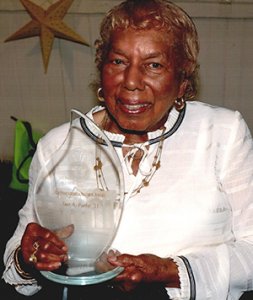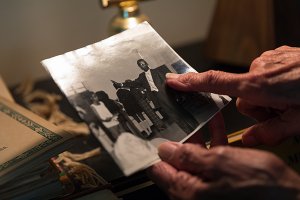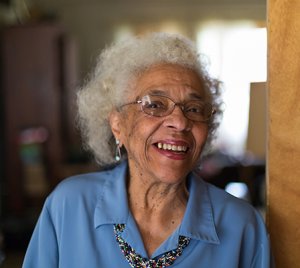We must deal with improving the lives of others.
Looking back, these words have been the driving force of both the career and life of Lou Jeanne Bray ’60 Walton, who describes social work as the love of her life.
As a faculty member, Professor Walton played a leadership role in identifying patterns of discrimination, especially those that were institutionalized, and devoted time to finding and implementing solutions. She was instrumental in developing the Martin Luther King Jr. Celebration at Valparaiso University and even received the inaugural MLK Award for making significant and lasting contributions to the improvement of the racial climate within the campus community.
That celebration marked a significant milestone, one of many in the decades since Professor Walton was one of the first African American students at Valpo.
“I first visited campus in 1955,” Professor Walton says. “We drove all the way from Pittsburgh. We stopped at two restaurants, early in the evening, and they didn’t want to serve us. My dad contacted President O.P. Kretzmann’s office, and finally we found a place where we could eat.”
At the time, Valparaiso was known as a “sundown town.” Pervasive across the United States, these communities were all-white municipalities or neighborhoods that practiced a form of segregation by enforcing restrictions excluding people of color via a combination of discriminatory local laws, intimidation, and violence.
As president of Valparaiso University from 1940 to 1968, the Rev. O.P. Kretzmann is often credited with helping to integrate the community by welcoming students and faculty of color. According to “Into a Wider World,” written by the late Karl E. Lutze, M.Div., associate professor emeritus of theology, President Kretzmann personally welcomed Valpo’s first African American student, Inez Parker ’51, at the train station:
Carrying her heavy bag, O.P. Kretzmann escorted Inez Parker to the campus. Instead of going directly on a diagonal, short-cut route to the campus, they together went a block north to Lincolnway Avenue. They walked the city’s main street as their route to the school. Peeking from behind curtains and in some instances stepping outside their little shops, all could see this president … carrying her suitcase, personally welcoming her. This highly respected leader of the community had made his statement and the message was clear. When the occasion called for standing up to be counted, O.P. was there.

Earlier this year Inez Parker ’51 was presented the 2018 Valparaiso University Alumni Association’s Distinguished Alumni award.
Inez also studied social work at Valpo, along with psychology and music. In 1947, before she could enroll, the city of Valparaiso had to designate Valparaiso University as an area in which an African American could spend the night. Inez gives special recognition to the efforts of President Kretzmann and Professor Lutze, as they were able to successfully change the restrictive city ordinance, allowing her to register as a student. In 2018, Inez was honored with the Valparaiso University Alumni Association’s Distinguished Alumni Award, which is the highest distinction the association can bestow and honors alumni who have enhanced the prestige of the University by virtue of their character, integrity, and nationally recognized personal accomplishments.
Inez was unable to return to campus to receive her award, so four Valpo representatives attended a wonderful celebration in her honor at St. Phillip’s Lutheran Church in Philadelphia and presented Inez with a 2018 Distinguished Alumni Award.
Inez admits she did experience discrimination during her years at Valpo; however, she received support and encouragement from the University administration, friends, and classmates and made many lifetime friendships.
Her career highlights include serving as chairperson of the Urban Church and Community Ministry Committee of Eastern Pennsylvania, which initiated a job-experience training program. Inez was elected to the Alabama Lutheran Academy and College and was the first elected woman of the Lutheran Church Missouri Synod Eastern District for Mission Services. She also created Community Homes Inc., which rehabilitates properties for sale to low- and moderate-income families.
Inez is very thankful for her Valpo education and knows that being a Valpo graduate helped build her confidence and ability to relate to people in a positive way that helped prepare her for her rewarding career.
A PASSION FOR OTHERS
When Professor Walton enrolled at Valpo in 1956, just a few years after Inez, there were four other African American students on campus — two married couples who lived in campus apartments. By the time she graduated, the number had increased to about a dozen.
While her focus as a student at Valpo was pursuing social work, Professor Walton, then known as “Boots,” also loved to dance and was part of the University’s traveling modern dance group. She participated in the “Miss Valparaiso” competition and was profiled in the spring 1960 edition of The Lighter, the student-run literary and art journal. The article says Professor Walton greeted people “in a way which makes them feel they have been friends for years” and identifies some of her interests as “people who have definite aims, professors who are intellectually stimulating, and theology that can be practically applied.” And even then, she professed a love and fascination for people.
“I learned about people from my mom. She had this thing about people, about love, about taking care of each other,” Professor Walton says. Her mother was a beautician, and Professor Walton often spent time in the beauty shop in their home. Two customers happened to be social work professors at the University of Pittsburgh, and they sparked her interest in the field. She had the chance to work with family services of Pittsburgh one summer, which solidified her passion for improving the lives of others.

Throughout her more than 35 years of service as a faculty member at Valpo, Professor Walton made an impact on campus and in the community in myriad ways — as an advisor to the Black Student Organization and member of the Advisory Council on Multiracial Concerns; volunteering for local nonprofits such as Brothers Keepers, the Open Housing Commission of Gary, Prisoners and Communities Together, and the Lutheran Human Relations Association; and serving as a member of her neighborhood “Block Club,” which analyzed housing regulations, city services, and beautification of the urban community.
She continues to advocate for community improvement in her current home of Gary, Indiana. Two years ago, Professor Walton started cross-cultural training for charter schools, and she’s currently working on a project with the pastor of a multicultural congregation in the Miller neighborhood. She’s known the mayor of Gary, Karen Freeman-Wilson, since she was three years old, and the longtime friends frequently discuss the progress that’s been made and the challenges that persist.
Professor Walton personally has been part of the progress in Gary, initially through field work at Campbell Friendship House during her senior year at Valpo. After experiencing harassment and discrimination from parents of her dance students, she was looking for a new opportunity, and one of her professors recommended her for a position at the settlement house working with young women.
“As soon as I started, I just loved them,” Professor Walton says. “I fell in love with the rough kids.”
Following graduation, Professor Walton earned her master’s degree from the University of Chicago and started a family. She continued to serve in communities in Gary, as well as Chicago, as a case worker working with foster children, single parents, and teenage parents.
This work remained her area of interest as a member of Valpo’s faculty, as her research expertise was in the area of understanding human systems in relation to social work interventions, particularly human behavior of urban youth and communities of color.
We need to make sure that we stay true to the issues of loving, caring, and diversity. I do believe we’ve seen change, and I have to remain hopeful and to teach hope and reconciliation.
In 1986, Professor Walton received the O.P. Kretzmann Research Award, which was established in 1976 by the Wheat Ridge Foundation, now known as We Raise Ministries, for research in the healing arts and sciences. Through the grant, she was able to partner with urban church ministries to determine possible coordination of youth educational programs with troubled young people. She connected with the mayor of Gary and formed a committee, holding various professional workshops, church and social service agency discussions, and interviews with a small group of teenagers at an institution that provided a residential setting for expectant mothers.
Initially, one of her research goals was to develop an educational resource for social service and pastoral counselors to enhance their knowledge base and enable them to more easily approach unmarried adolescents, both in terms of prevention and intervention. As she conducted interviews and learned more about the situation, Professor Walton wanted to discover why the young girls were expectant mothers and how teenage mothers made changes in their lives after the birth of their children.

The research project culminated in a video made with four congregations in Gary titled “Teen Raps.” Professor Walton spent months writing the video script with input from teenagers, focusing on “what’s good about life.” The intent wasn’t to concentrate on the dangers and temptations faced by youth, but instead to emphasize positive outcomes.
“Two of my friends used the video in their classes, but it wasn’t widespread,” Professor Walton says. “Instead, what grew out of it was a number of friendships that last to this day.”
Throughout her undergraduate and professional career, that connection to youth has been a constant. In fact, it’s what
drove Professor Walton to return to her alma mater to instill the lessons she’d learned in future generations.
CALLED BACK TO VALPO
In the early 1960s, Professor Walton received a call from some African American students at Valpo who were seeking advice on how to deal with racial injustices.
Then came another call, this time from students wanting to talk about the role of African American women.
Finally, an invitation from her mentor and then-chair of the social work department, Margaretta S. Tangerman, drew
Professor Walton to campus. First, in 1970, to teach one course. Then two. She became a full-time member of the faculty in 1973 and chair of the social work department in 1982. She was also the first African American woman to receive tenure at Valparaiso University.
Professor Walton taught courses on a variety of subjects, including Vulnerable Populations, Professional Development and Human Services, Social Work Practice, Group and Macro Systems, and Strategies of Intervention. She also served as a field supervisor for Valpo students completing their required clinical experiences, and she was as a visiting professor at the University of Bophuthatswana, now known as North-West University, in South Africa.
“I went to every village to meet kids,” Professor Walton says. “There were just five books in the library for 100 students, who would take turns, share, and read to each other. They would leave at 4 a.m. for an 8 a.m. class. Some young girls were raped on the way to class. Yet they started each day singing.
“When I returned to Valpo, I told students here, ‘don’t you ever complain that you have to go get a book’.”
While diversity in the Valparaiso area had started to improve, Professor Walton says she continued to experience discrimination and harassment as a faculty member, even being followed by police when visiting students’ fieldwork sites. But she continued to strive for progress and served a vital role on issues involving race, gender, social class, economic opportunity, and justice, up to and following her retirement in 2005.
It can often be difficult to measure the impact a person has on the lives of others. Beyond accolades, courses taught, and committee memberships, the way a person makes others feel is frequently the best indicator.
During Professor Walton’s retirement celebration, student- turned-colleague Barb Crumpacker ’83 Niedner, clinical associate professor of social work, summed up this impact in her remarks:
You seemed to have an uncanny ability to make a place for anyone regardless of their size or shape, the color of their skin, the depth of their love or disdain for others, or their curiosity for the world or lack thereof. You seemed to be determined to singlehandedly alter the course of futures, and if you could not alter the course you were going to definitely impact it in a huge way. You had that rare capacity to see potential in everyone, to find the strength camouflaged in what appeared to be a person knee-deep with flaws. As I look back on those beginning days, I now know that was the essence of you, intricately woven with the profession of social work. You were about helping people to help themselves. You were about serving God’s humanity and being used for a purpose, namely to love and bring Light to those in darkness.
A LEGACY OF HOPE
Flash forward to 2018, and Professor Walton found herself once again being honored during Valpo’s MLK Celebration. Ensuring her legacy of leadership and service will endure in perpetuity, the University established the Lou Jeanne Walton Scholars program for underrepresented students.
Professor Walton says the Black Alumni Organization developed the program and surprised her with the idea, marking yet another significant milestone in her journey.
She continues to give back to the University and is a frequent guest speaker at Black History Month events. And in the decades since her first visit to campus, Professor Walton says she has seen “mounds of progress.”
“Just look at the population on campus, the diversity — I love it,” she says. “That, to me, is progress. And that there are people committed to teaching and teaching well. Students come to Valpo at 17, 18, 19 and have a decent opportunity for a solid education and exposure to people from different backgrounds.”
Professor Walton initially came to Valpo to study social work in a church-related educational setting, and her faith continues to inform her worldview.
“I’ve seen progress. I need to see more progress,” she says. “I keep trying to learn more about being a Christian, and being a Christian is hard work. I ask myself, ‘What do you do to keep yourself alert and open?’ And there’s this thing called love — God’s love.”
“We need to make sure that we stay true to the issues of loving, caring, and diversity. I do believe we’ve seen change, and I have to remain hopeful and to teach hope and reconciliation.”
